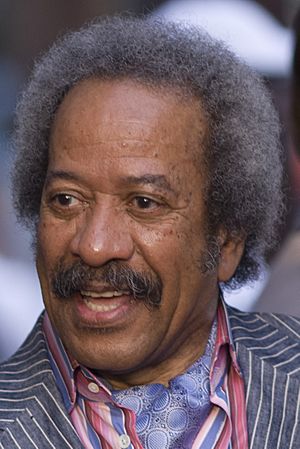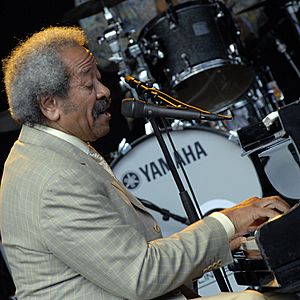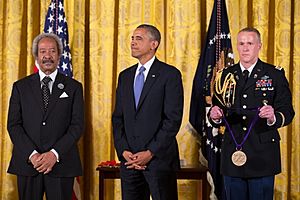Allen Toussaint facts for kids
Quick facts for kids
Allen Toussaint
|
|
|---|---|

Toussaint at the Freret Street Festival, New Orleans, 2009
|
|
| Background information | |
| Birth name | Allen Richard Toussaint |
| Born | January 14, 1938 Gert Town, Louisiana, U.S. |
| Origin | New Orleans, Louisiana |
| Died | November 10, 2015 (aged 77) Madrid, Spain |
| Genres | |
| Occupations |
|
| Instruments |
|
| Years active | 1958–2015 |
| Labels |
|
Allen Richard Toussaint (January 14, 1938 – November 10, 2015) was an American musician, songwriter, arranger, and record producer. He was a very important person in New Orleans rhythm and blues music from the 1950s onwards. Many famous musicians recorded songs that Toussaint wrote. He also produced hundreds of recordings. Some of the most well-known songs he produced include "Right Place, Wrong Time" by his friend Dr. John, and "Lady Marmalade" by Labelle. Toussaint was known as a quiet but powerful force behind many famous songs.
Contents
Biography
Early Life and Music Career
Allen Toussaint was the youngest of three children. He was born in 1938 in New Orleans, Louisiana. He grew up in a type of house called a shotgun house in the Gert Town neighborhood. His mother, Naomi Neville, often welcomed musicians into their home. She would feed them as they practiced and recorded with her son. Allen's father, Clarence, worked on the railway and played the trumpet.
Allen Toussaint learned to play the piano when he was a child. He took music lessons from an older neighbor, Ernest Pinn. As a teenager, he played in a band called the Flamingos with guitarist Snooks Eaglin. A big influence on Toussaint's piano playing was the "second-line" style of Professor Longhair. This style uses a special kind of rhythm called syncopation.
When he was 17, Toussaint got a lucky chance to fill in for another pianist, Huey "Piano" Smith. He played with Earl King's band. After this, he met a group of local musicians led by Dave Bartholomew. They often played at the Dew Drop Inn nightclub.
Toussaint's first recording was in 1957. He played piano for Fats Domino on the song "I Want You to Know". Fats Domino then added his singing over Toussaint's piano playing. Toussaint's first success as a producer came in 1957 with Lee Allen's song "Walking with Mr. Lee". He started playing regularly in Bartholomew's band. He also recorded with other top New Orleans artists like Fats Domino and Smiley Lewis.
A talent scout named Danny Kessler noticed Toussaint playing as a sideman (a musician who plays with a main artist). Toussaint then recorded for RCA Records under the name Al Tousan. In 1958, he recorded an album of instrumental songs called The Wild Sound of New Orleans. This album included his song "Java". This song later became a big hit for Al Hirt in 1964.
Success in the 1960s
Minit and Instant Records
In 1960, Joe Banashak hired Toussaint to work for his record labels, Minit Records and Instant Records. Toussaint's job was to be an A&R man and a record producer. An A&R man finds new talent and helps them record. A producer helps make the music sound good. Toussaint also worked for other labels.
Toussaint played piano, wrote songs, arranged music, and produced many hit songs in the early and mid-1960s. He worked with New Orleans R&B artists like Ernie K-Doe, Chris Kenner, and Irma Thomas. He produced Lee Dorsey's first hit song, "Ya Ya", in 1961.
The early to mid-1960s were a very creative time for Toussaint. Some famous songs he worked on include "Ooh Poo Pah Doo" by Jessie Hill and "Mother-in-Law" by Ernie K-Doe. He also wrote "Fortune Teller", which was covered by many rock groups like The Rolling Stones and The Who.
Toussaint wrote about twenty songs using his parents' names, Clarence and Naomi. Sometimes he used the name "Naomi Neville" as a pseudonym (a fake name). These songs include "Fortune Teller" and "Pain in My Heart". "Pain in My Heart" was a hit for Otis Redding in 1963.
Sansu: Soul and Early New Orleans Funk
In 1963, Toussaint was called to serve in the United States Army. He still recorded music when he was on leave. After he left the Army in 1965, he started a company called Sansu Enterprises with Marshall Sehorn. This company included a record label. They recorded artists like Lee Dorsey and Betty Harris.
Lee Dorsey had several hit songs written by Toussaint. These include "Ride Your Pony" (1965) and "Working in the Coal Mine" (1966). The main musicians who played on many of these Sansu recordings were Art Neville, Leo Nocentelli, George Porter Jr., and Ziggy Modeliste. They later became famous as the band The Meters.
The music Toussaint produced during these years, with the help of The Meters, had a new, funkier sound. They used more syncopation and electric instruments. This helped create the modern New Orleans funk sound.
From the 1970s to the 1990s
Toussaint continued to produce music for The Meters when they started releasing their own records in 1969. He developed an even funkier sound in the 1970s. He wrote and produced for many artists, including Dr. John. Dr. John's 1973 album In the Right Place had the hit song "Right Place, Wrong Time".
In the 1970s, Toussaint also started working with artists from outside New Orleans. These included B. J. Thomas, Robert Palmer, and Willy DeVille. He also arranged horn music for The Band's albums. Boz Scaggs recorded Toussaint's song "What Do You Want the Girl to Do?" in 1976. This song was also recorded by Bonnie Raitt and Elvis Costello.
In 1973, Toussaint and Sehorn opened their own recording studio called Sea-Saint Studios in New Orleans. Toussaint also started recording music under his own name, singing and playing piano. His solo career was most successful in the mid-1970s with albums like From a Whisper to a Scream and Southern Nights.
Around this time, he worked with the group Labelle. He produced their famous 1975 album Nightbirds, which included the number one hit "Lady Marmalade". In the same year, Toussaint worked with Paul McCartney and Wings on their hit album Venus and Mars.
In 1973, The Pointer Sisters covered Toussaint's song "Yes We Can Can". It became a pop and R&B hit. Two years later, Glen Campbell covered Toussaint's "Southern Nights". This song became number one on the pop, country, and adult contemporary music charts.
In 1987, Toussaint was the musical director for an off-Broadway show called Staggerlee. The show used songs from his collection. In the 1980s and 1990s, hip hop artists started using parts of his old songs in their new music. This is called sampling. This made people interested in his songs again.
The 2000s

In 2005, Hurricane Katrina caused a lot of damage in New Orleans. Toussaint lost most of his belongings, including his home and his recording studio, Sea-Saint Studios. He had to leave New Orleans and lived in New York City for several years. He later returned to New Orleans and lived there for the rest of his life.
In 2006, Toussaint released a collaborative album with Elvis Costello called The River in Reverse. This album was recorded in New Orleans after Hurricane Katrina. In 2007, Toussaint performed a duet with Paul McCartney. They sang a song by Fats Domino called "I Want to Walk You Home".
In 2008, Toussaint's song "Sweet Touch of Love" was used in a commercial. He also performed at several music festivals in London. In 2009, he performed for the PBS series Austin City Limits. He also appeared on Elvis Costello's TV show Spectacle. In 2010, Toussaint played piano on Eric Clapton's album Clapton.
Toussaint started performing more often later in his life. He played regular Sunday brunch sessions at a pub in New York City. He once said, "I never thought of myself as a performer.... My comfort zone is behind the scenes." In 2013, he worked on a ballet with a choreographer named Twyla Tharp.
Death
Allen Toussaint died on November 10, 2015, in Madrid, Spain. He was on tour at the time. After a concert, he had a heart attack at his hotel and passed away at the hospital. He was 77 years old. He was supposed to perform at the London Jazz Festival and with Paul Simon soon after.
His last recording, American Tunes, was released after he passed away in 2016. He was survived by his three children, Clarence, Naomi, and Alison, and several grandchildren. His children had helped manage his career in his final years.
Many people spoke about Toussaint's importance after his death. Quint Davis, who produces the New Orleans Jazz and Heritage Festival, said that Allen Toussaint is among the greatest New Orleans musicians. Paul Simon said they were friends and colleagues for almost 40 years. The Daily Telegraph newspaper called Toussaint "a master of New Orleans soul and R&B, and one of America's most successful songwriters and producers." He wrote so many songs that he sometimes forgot some of them!
Partial Discography
- The Wild Sound of New Orleans (1958)
- Toussaint (1971, also known as From a Whisper to a Scream)
- Life, Love and Faith (1972)
- Southern Nights (1975)
- Motion (1978)
- I Love a Carnival Ball, Mr Mardi Gras Starring Allen Toussaint (1987)
- Connected (1996)
- A New Orleans Christmas (1997)
- Allen Toussaint's Jazzity Project: Going Places (2004)
- The Bright Mississippi (2009)
- American Tunes (2016)
Awards and Honors

Allen Toussaint received many awards for his music.
- In 1998, he was added to the Rock and Roll Hall of Fame.
- In 2009, he joined the Louisiana Music Hall of Fame.
- In 2011, he was inducted into the Songwriter's Hall of Fame and the Blues Hall of Fame.
- In 2013, President Barack Obama gave him the National Medal of Arts. This is a very high honor for artists in the United States.
- In 2016, after he passed away, he won the Pinetop Perkins Piano Player award at the Blues Music Awards.
- In January 2022, the New Orleans City Council voted to rename a street in New Orleans, Robert E. Lee Boulevard, to Allen Toussaint Boulevard in his honor. This change happened later that month.
See also
 In Spanish: Allen Toussaint para niños
In Spanish: Allen Toussaint para niños
 | Emma Amos |
 | Edward Mitchell Bannister |
 | Larry D. Alexander |
 | Ernie Barnes |

